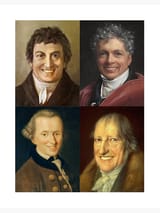Search Results
6/28/2025, 5:29:01 PM
We need to have a serious talk about Schelling, /lit/. For too many people Schelling is the man who broke out of the crude subjectivism of Kant and Fichte and made philosophy take nature seriously for the first time as nature, not merely a product of divine activity or an arena for human acting, a genuine subject-object of which consciousness is only the highest expression - a living nature, not a great big determino-mechanistic system like in Spinoza.
This is the story Schelling tells about himself but it is false. Fichte had already unified nature and consciousness - as early as 1796 he is writing about the distinction being nothing but 'appearance'. And even in his (in)famous 1795 Foundation of the Entire Wissenschaftslehre the second and third foundational principles are expressions of this unity, while his first principle is, not a mere abstraction of the empirical I, the task of thinking oneself from the Introductions, but God (as he affirms in a 1795 letter to Jacobi as well as in his 1799 lectures), prior to both nature and consciousness. People think of Fichte as a crude subjectivist because they get filtered by his transcendental stance - he puts consciousness first and derives nature from it in order to save freedom and morality and show that they can coexist, not because consciousness actually is first. Only God is first, and the pure will itself is a synthesis of activity and limitation, not mere subjective activity. So nature is spoken of as a 'negative magnitude', as something we 'produce' in response to primitive limitation (the Anstoß), and so on, because of his particular stance. But if you follow him through his Jena system you will find him, in the Sittenlehre and the 1799 lectures especially, affirming the unity of the will, the intellect and the body, and of the body and nature as a whole.
This is the story Schelling tells about himself but it is false. Fichte had already unified nature and consciousness - as early as 1796 he is writing about the distinction being nothing but 'appearance'. And even in his (in)famous 1795 Foundation of the Entire Wissenschaftslehre the second and third foundational principles are expressions of this unity, while his first principle is, not a mere abstraction of the empirical I, the task of thinking oneself from the Introductions, but God (as he affirms in a 1795 letter to Jacobi as well as in his 1799 lectures), prior to both nature and consciousness. People think of Fichte as a crude subjectivist because they get filtered by his transcendental stance - he puts consciousness first and derives nature from it in order to save freedom and morality and show that they can coexist, not because consciousness actually is first. Only God is first, and the pure will itself is a synthesis of activity and limitation, not mere subjective activity. So nature is spoken of as a 'negative magnitude', as something we 'produce' in response to primitive limitation (the Anstoß), and so on, because of his particular stance. But if you follow him through his Jena system you will find him, in the Sittenlehre and the 1799 lectures especially, affirming the unity of the will, the intellect and the body, and of the body and nature as a whole.
Page 1
